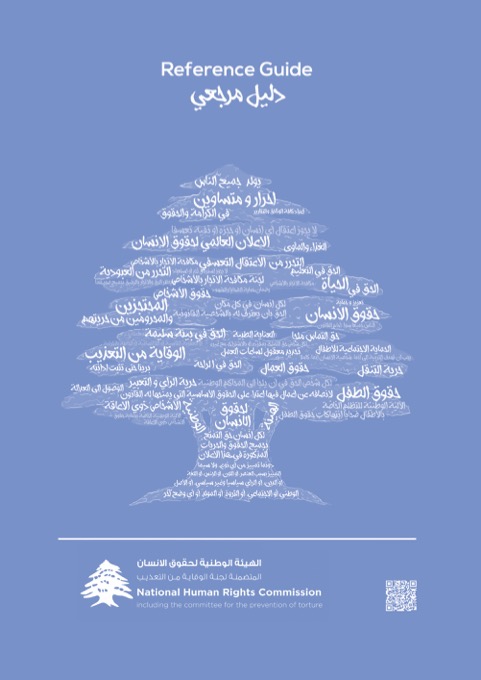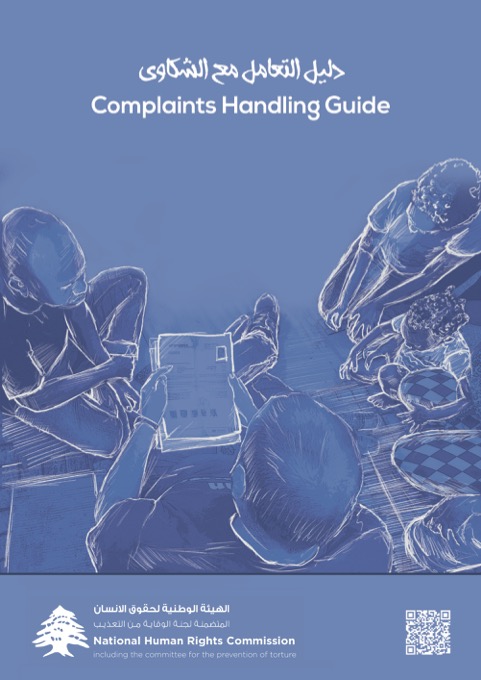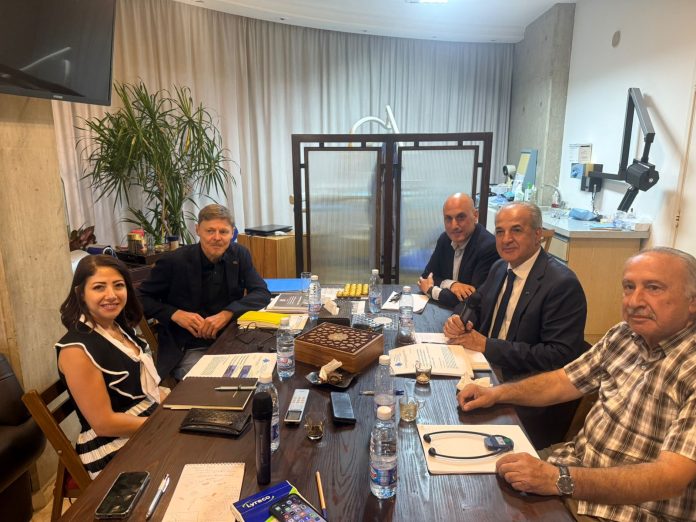At the invitation of the Government of Lebanon, the UN Special Rapporteur on extrajudicial, summary or arbitrary executions, Dr. Morris Tidball-Binz, conducted an official country visit from 29 September to 10 October 2025 to assess protection of the right to life under international human rights and humanitarian law.
As part of this mission, on 07 October 2025 Dr. Tidball-Binz visited the NHRC-CPT premises in Beirut for an in-depth technical briefing and exchange with the Commission, including Mr. Fadi Gerges (President), Mr. Ali Youssef (Treasurer), and Mr. Bassam Al Kantar (Commissioner for International Relations). The meeting focused on institutional obstacles to effective death-investigation, case files on unlawful killings and custodial deaths, and pathways to strengthen medico-legal capacities in line with the Minnesota Protocol (2016).
NHRC-CPT statement: “Every life matters — and protecting it is both a legal duty and a moral responsibility. We stand ready to cooperate with the Special Rapporteur and all authorities to ensure truth, justice, and prevention.”
The NHRC-CPT also expressed its appreciation to the Office of the UN High Commissioner for Human Rights (OHCHR)—in particular Ms. Yasmine Ashraf, Human Rights Officer, Protection, Religion, Accountability and Human Security Section, Special Procedures Branch—for her professionalism and coordination throughout the preparation process.
Briefing Note submitted to the SR (2021–2025)
Drawing on five years of monitoring, detention visits, forensic documentation, and field evidence, the NHRC-CPT provided an independent, evidence-based account of the right-to-life situation in Lebanon (2021–2025). The note aims to:
-
Inform findings on extrajudicial, summary or arbitrary executions and state responses;
-
Highlight legislative/institutional shortcomings hampering prevention, investigation, and accountability;
-
Recommend measures to align Lebanon with the ICCPR, CAT, and the Minnesota Protocol (2016).
Institutional context
Established by Law No. 62/2016 as Lebanon’s NHRI and NPM, the Commission remains partially non-operational due to the Government’s failure to adopt five essential decrees (internal/financial regulations, code of ethics, members’ compensation, contracting procedures). Despite this, the NHRC-CPT has maintained investigations and advisory work through donor support and members’ voluntary commitment.
Key findings (2021–2025)
-
Conflict-related killings & IHL violations: Extensive attacks with high civilian tolls, including incidents affecting journalists, medical workers, and UN facilities, and alleged use of white phosphorus in populated areas.
-
Deaths in custody & torture: 200+ detention visits revealed overcrowding, medical neglect, and corruption; multiple preventable deaths and unresolved torture cases persist. NHRC-CPT opened an independent investigation into the reported suicide of a 14-year-old (M.A.) at Warwar Juvenile Rehabilitation Center (29 Sept 2025).
-
Excessive use of force: Lethal force by security agencies during protests and operations, with non-independent inquiries that contravene the Minnesota Protocol.
-
Political killings & impunity: Targeted killings of activists and officials remain unresolved; the Beirut Port Explosion victims still await justice.
-
Systemic barriers: Judicial inertia, political interference, gaps in Law 65/2017 on torture, military jurisdiction over civilians, and an inactive NMIRF since 2021.
Priority recommendations
-
Accountability for conflict-related killings: Support an independent international investigative mechanism; reinstate cooperation with international justice mechanisms.
-
Custodial deaths: Adopt a national death-investigation protocol consistent with the Minnesota Guidelines; guarantee unimpeded NHRC-CPT access to all detention sites.
-
Justice reform: Amend Law 65/2017 (no statutes of limitation; full CAT alignment); adopt the judicial independence law; restrict military courts to strictly military offenses.
-
Medico-legal capacity: Establish an Independent National Forensic Institute with standardized procedures, quality assurance, and independent oversight.
-
Protection & transparency: Enact witness-protection legislation; publish annual statistics on deaths in custody and law-enforcement killings; reactivate the NMIRF.
-
Socio-economic determinants: Integrate public-health, food-security, disability inclusion, and environmental risk controls into a national right-to-life strategy.
The SR’s public programme
The Special Rapporteur met Government officials, the judiciary and legislators, international organizations, civil society, academics, medico-legal and forensic specialists, and victims and families in Beirut, Naqoura, Tyre, Saida, Nabatiyeh, Baalbek, and Tripoli.
The UN Special Rapporteur on extrajudicial, summary or arbitrary executions, Morris Tidball-Binz, expressed during a Press conference on Friday, 10 October 2025, 15:00 — United Nations House (ESCWA), his solidarity with survivors and the families of those killed in Lebanon, amid the widespread destruction, loss of life and civilian suffering resulting from hostilities by Israel.
“Every potentially unlawful death must count, and every family is entitled to truth and justice,” the Special Rapporteur said in a statement concluding an official visit to Lebanon.
“Lebanon has the legal tools to act now and demonstrate that casualties are not mere numbers, they have names,” he said. The expert paid tribute to those who lost their lives in the line of duty, expressing deep admiration and support for journalists, healthcare workers, and others who continued their vital work despite the dangerous circumstances.
“Lebanon has the legal tools to act now and demonstrate that casualties are not mere numbers, they have names,” he said. The expert paid tribute to those who lost their lives in the line of duty, expressing deep admiration and support for journalists, healthcare workers, and others who continued their vital work despite the dangerous circumstances.
Tidball-Binz welcomed ongoing legislative efforts to strengthen the independence of the judiciary, and encouraged authorities to report and, where appropriate, prosecute conduct that may amount to international crimes, in accordance with Lebanon’s obligations under international human rights law and, where applicable, international humanitarian law.
“Accountability requires prompt, effective, thorough, independent and impartial investigations and criminal proceedings, which enable access to reparation for victims and their families,” the expert said.
The Special Rapporteur – who is also forensic doctor – observed the urgent need to enhance the medico-legal death-investigation capacity in Lebanon, which represents a critical component of any investigation into potentially unlawful deaths, whether arising from suspected suicide, deaths in custody or alleged war crimes.
During his visit, the expert explored the possibility of establishing a national medico-legal institute, with standardised procedures, quality assurance and independent oversight, to ensure competent determination of the cause, manner and circumstances of death.
“Building modern forensic capacity, consistent with the Minnesota Protocol on the Investigation of Potentially Unlawful Death (2016), is indispensable to credible investigations,” he said.
Tidball-Binz said investigations must be victim-centred, ensuring meaningful participation of families, protection of witnesses and professionals, and the preservation of evidence and the chain of custody. He also underscored the need for systematic data collection and public reporting on casualties and investigative findings, as well as close coordination among justice, health and security institutions, including with specialised forensic services, to guarantee accountability and transparency.
During his visit, the Special Rapporteur met with government officials, members of the judiciary and prosecution services, security and investigative authorities, medico-legal and health professionals, UN representatives, civil society organisations, academics, and survivors and families of victims in Beirut, Naqoura, Tyre, Saida, Nabatiyeh, Baalbek, and Tripoli. He expressed appreciation for the access and cooperation extended by authorities and for the constructive engagement and contributions of all interlocutors.
The Special Rapporteur will present a full report on his visit to Lebanon to the UN Human Rights Council in June 2026.
هذه المقالة متاحة أيضًا بـ: العربية (Arabic) Français (French)



